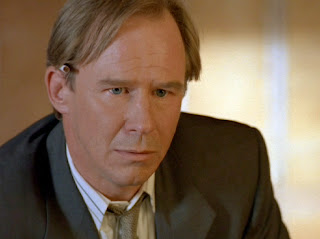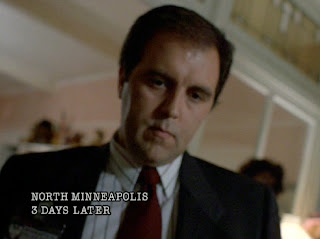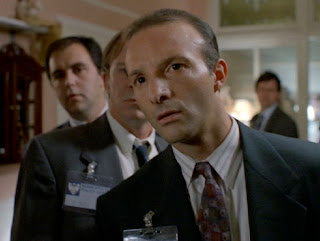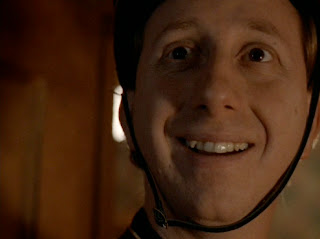Sep-19-2010
This Is Who We Are
Patrick Harbinson interview
[Original article here]

Writer Patrick Harbinson manages to juggle writing duties in both Hollywood and the UK. An ex-soldier, he served his writing apprenticeship penning episodes of Soldier Soldier and Heartbeat before moving out to Hollywood in 1995. Writing gigs followed on Millennium, Law & Order: Special Victims Unit, E.R., James Cameron’s Dark Angel and 24. Patricks’s most recent TV credits are for the ITV firefighting drama Steel River Blues, Red Cap and the world-wide British born success “Wire In The Blood”. Patrick agreed to talk exclusively to TIWWA about his time on Millennium and I know you will all join with me in expressing your gratitude to him for taking time out of his busy schedule.
TIWWA: You remained with “Millennium”, in some capacity, for the three seasons of its existence and three seasons which saw a number of changes to the shows thematic as well as the coming and going of characters and showrunners. How do you view the experience of Millennium as a whole in retrospect and what were the notable successes of the show in your opinion?
PATRICK HARBINSON: was only on the ‘staff’ of Millennium for its third and last year. I wrote – co-wrote in fact with Bobby Moresco – an episode in the first season, but I wasn’t on staff then. I had worked with Bobby on a short-lived but critically successful drama series called EZ Streets, created and run by Paul Haggis (Oscar winner for Crash). When EZ Streets died, Chris Carter hauled Bobby onto Millennium and Bobby then called me and asked if I had any ideas. I did. So I wrote one episode in that year, and then, as I said, came on staff for the third year.
Changes? My impression of the first year was of a show struggling for identity after its extraordinary opening. I remember someone (who was closely involved with the show) saying that Millennium’s initial success on the back of massive publicity – new show from the creator of the X-Files, etc. – was the worst thing that could have happened to it, because it created an expectation of great things – among fans and Fox executives – that few shows could have sustained. So by the time I turned up with a story about horses they were quite glad to have something that wasn’t about serial killers – though of course it was. I had nothing to do with the second year so can’t comment on that. Third year, once Chip Johannessen took over the reins fully from Michael Duggan, the series became a gentler, more mysterious, more enquiring animal. If any TV series could be said to have aspired to magic realism it was Millennium.
Most of this change – in year 3 – was down to Chip. Once I found my feet on the show, I loved what I was able to write – what Chip encouraged me to write – and it is still one of the highlights of my career.
TIWWA: Many members of the cast and crew hold “Millennium” in high regard and consider it to be a particular high-point of their careers. It has been espoused that people knew they were making ‘something special’ at the time. Do you concur with this and what do you believe it was that made “Millennium” such a unique experience?
PH: Yes, it was an unique experience, but I don’t think that, at the time, I realised quite how unique. I certainly haven’t had the same freedom to experiment in anything I’ve done for US television – for any television since.

TIWWA: You wrote the first season episode, “Broken World” which is widely regarded to be an episode that attempted to explore the boundaries of what could be achieved within the remit of “Millennium” as well as being evidence to counter the ‘serial killer of the week’ label which some critics attached to it. Was it a conscious decision to play with the format a little and how easy was it to be creative with the format and were writers encouraged to do that?
PH: I walked into Millennium rather innocently, having seen the pilot and a few episodes, but not really having much idea of its political or creative currents and stresses. What I did have though was a rough story based on some particularly nasty crimes that were happening in England around that time – I guess it must have been 1995, 96? – which involved the mutilation of horses. I was a. appalled, b. deeply curious, as to the ‘why’ of it all. Then I discovered, as any crime writer soon will, that according to the rubric, cruelty to animals is one of the indicators of a potential serial killer. So I thought what if Frank Black is drawn to this crime (non-human victims notwithstanding) because he recognises the darkness in it.
Then, researching deeper, looking to relocate it to the US, I came across the pregnant mare farms, the whole PMU thing, and I thought, bloody hell, this really is weird. And from that an episode emerged, which I pitched to Bobby, then, with his support, pitched to Chris Carter, and after some of the usual story struggles, Chris said Okay, write it. If I hadn’t been teamed with Bobby M at that stage I doubt Chris would have let me go with it on my own, so without Bobby it would never have happened. Also, I think – though I don’t know – that they were beginning to struggle for stories, so this idea was something of a relief.
Did it encourage others to be creative with the format? I don’t know. It certainly showed me how elastic the show could be, and it taught me the invaluable lesson that the deeper you dig into a story the more you’re going to learn, the richer your script is going to be. Broken World eventually won a Genesis Award. I was proud of that.
TIWWA: I know various statements have been made over the years that Fox desired thematic changes to the second season of the show and Glen Morgan and James Wong did their best to accommodate their dictates whilst fighting against some they didn’t agree with. Is it difficult for a production team to work on a show that has established a format but is facing outside interference in terms of its continuing direction?
PH: Yes, it’s a nightmare when you and the network have different ideas about the show, or different expectations, But I thought some of what Morgan and Wong did – I didn’t watch the whole Season – was extraordinary. The trouble with Millennium is that the format was/is somewhat limited, and the arc of Frank Blank ‘seeing his way’ through crime after gruesome crime could become familiar – to the writers as much as the audience. If you consider a show like Criminal Minds which functions in the same arena and has had enormous success for – I think – at least six years, twice Millennium’s run, you’ll see that the creators have stocked the show with a large regular cast so that the interplay of character and relationships among the regulars becomes as important for the viewer as the actual crimes those regulars are investigating.
TIWWA: When production began on the third season of the show, Michael Duggan was the showrunner but he left fairly early on into the third season leaving Chip Johannessen to pick up where he left off. Is it easy for a production team to adapt when a show loses ‘the hand at the rudder’ and do you recall the transition from one showrunner to the other to be a relatively seamless affair?
PH: Not entirely seamless for me personally in that Michael had brought me onto the show, and by the time he left I hadn’t really developed a relationship, personal or creative, with Chip. So once Michael had gone – he’d only wanted to be a transitional figure anyway – there was, for me, an uneasy couple of months as I tried to establish myself, and work out Chip’s story-telling style. As it turned out my sensibilities were much closer to Chip’s than anyone else I have ever worked with, but that was not immediately apparent – to either of us. In fact, Through a Glass, Darkly, my first script, was sliding alarmingly down the filming order, and it was only when Chris Carter – rather arbitrarily – threw out another script and asked what else was ready, that my script got onto the schedule. But after that it was all fine and dandy.

TIWWA: “The Sound of Snow” is rightly considered one of the finest episodes “Millennium” and fans have often wondered why it took so long to resolve Frank and Catherine’s story considering the state of their relationship when Megan Gallagher left the show. Was it a bitter-sweet experience to know that Megan would be returning albeit for a single episode and a daunting one considering the level of anticipation there would be for such a story?
PH: I had no idea it was thought of so highly, that’s nice… But this episode arose entirely out of my efforts – almost literally – to go into stream-of-consciousness story-telling and just see where it ended up. So I started with a girl driving down a forest road and she puts a tape in the tape deck – it was the 90s – and there’s this gentle hiss, and then it starts to snow, and she drives on thinking how pretty, but then she starts to hear the flakes hitting the windscreen, and it’s weird, and then scary, and they’re getting louder, and louder, and then one cracks the windscreen, and… etc. etc. I was doing stuff, coming up with stuff, just to see if I could keep Chip (and Ken Horton – Ken was always there) listening, not interrupting, waiting to see what would happen next.
If someone were to analyse seriously the genius of Chris Carter’s story-telling, it’s that: keep your audience suspendeded in the dark waiting to see what happens next. Anyway, after that came the struggle to make it all mean something, relate it to Frank, find an episode in it. And I realised, after several weeks’ uncertainty, that these mysterious cassettes were a kind of consciousness-enhancer, sending their listener into a quasi-hypnotic state where the past became physical, real. So I asked Chip and Ken if we could bring Megan back, and they said okay, and we had our story, and I was able to resolve one of the big unanswered questions of the series. Was it daunting, the Megan part of it? If I’d been asked to write an episode specifically resolving the Megan/Frank relationship, that would have been daunting, but as it was, coming at it backwards, as it were, it seemed simple, logical, and right. I was simply finding closure for her, for us.
TIWWA: Another particularly well received episode is “Darwin’s Eye” which is a superb concept that really toys with the viewer in making them perceive a conspiracy, in true “Millennium” style, when no conspiracy exists. Could you give us some insight into how you conceived of the story and what the inspirations behind it were?
PH: Once I’d finished an episode I would immediately start the area into odd areas of research, odd reading, to try and find the germ of the next idea – you see how far we’d come from serial killers. At the time of Darwin’s Eye, I’d just finished – entirely by chance – a biography of Darwin, and I’d come across the fact that Darwin was worried about the eye – that it didn’t quite fit with his theory of evolution, And pondering all this – without smoking anything – I found this voice saying: ‘So you start with the primal ooze… and you end up with Hitler, Mozart, me…’ Anyway, I put a face to the voice and the whole thing just snowballed into this story of a paranoid girl – victim or psycho, who knows? – and her journey towards justice, or retribution. And I married this exercise in (false?) paranoia with Klea Scott’s story of (true?) paranoia – origami, wooden boxes, her father folding her sister’s face into flowers, palms in the nuclear wind. I really wasn’t smoking anything, but it was for me one of the most exciting and surprising writing experiences I’ve ever had. Ken Fink directed brilliantly. Tracy Middendorf was great. Does it actually add up to anything? I don’t know, but it was a wonderful ride and couldn’t have happened on any other show.

TIWWA: When you approached the script of “Via Dolorosa” were you aware at the time that you penning the beginning of the end, so to speak, and how conscious were you of affording the fans closure if that was the case? Am I right in thinking that people were still unsure as to the fate of the series until relatively late in third season?
PH: I don’t remember a lot about Via Dolorosa which I wrote with another friend Marjorie David. But I think we felt that the show was coming to an end. Though the fractured free-form style of Season 3 led to many lovely episodes, especially Chip’s, it could be confusing, indeed irritating, to the audience. So, by the time we were writing Via Dolorosa, yes, I think we thought it was heading for the finish.
TIWWA: I was a huge admirer of “Wire In The Blood” and I know “Millennium fans” who appreciate the series consider it a British equivalent of “Millennium” in the sense that there were tangible similarities between the two shows and a similar high quality of story telling and production. Did you as writer perceive the similarities in the way some viewers did and how do you compare working on a “Wire In The Blood” script to penning an episode of “Millennium”?
PH: If anyone’s read Val McDermid’s Wire in the Blood novels, the first of which is The Mermaids Singing, they’ll see that the Tony Hill (Robson Greene) character is quite serious, quite dark, quite flawed. It was the awareness not only of Robson’s last big English role, Touching Evil, but also of Lance’s character in Millennium, that made me change – or argue that we should change, and happily people agreed – the character of Tony Hill and make him, well, funny, clumsy, muttering, almost autistic, in everything except his perceptions, his analyses.
I knew how funny Robson could be as an actor, so I knew he could do it, and I think this humour was a big part of the show’s success in the UK and abroad. So Millennium was really important in that it told me I couldn’t hope – didn’t want to – replicate Frank Black in a UK context. As far as I remember, in the first script I had very little – if any – of Robson ‘seeing what the killer sees’ – those Frank Black flashes that were a signature of Millennium. What I replaced them with was genuine forensic psychology, which led to crash courses in criminal psychology for me, and much horrible trawling through crime scene books, true crime stories. To be honest, I was deeply uncertain as to whether Wire in the Blood would succeed; it had a gothic gore to it that was even beyond what we’d done on Millennium, and I wasn’t sure that Robson and Hermione would be enough to lift it. But the series was beautifully made by Coastal Productions, and could be more daring in its direction, its editing, its use of sex and violence, than Millennium.
Compare writing experiences? Once I knew what I was doing, could do, on Millennium it was actually great fun. Writing Wire in the Blood was always tough – partly because it’s 100 plus minutes rather than 43, the stories had to go a bit deeper and a bit darker into uncomfortable places – if they were to be any good, that is. Also, and this might not seem significant but it was: Millennium was intensely visual as a writing experience, we’d almost challenge each other to go for pages without a word of dialogue – partly because Lance was so powerful as a non-verbal actor, partly because it was just cool. Whereas Wire in the Blood could be – at least in my scripts, at least in the Robson scenes – literally crammed with words: I wanted Robson almost never to stop talking, even to himself – not that it couldn’t be visual too, but words were more important: our lead character was a doctor, I wanted him always to be wrestling with words, trying to explain the inexplicable.

TIWWA: “Prayer of the Bone” (“Wire In The Blood”) and “Through A Glass Darkly” both share a similar central theme in that the audience, and the protagonist, initially believe an innocent man to be guilty of a crime and deserving of the punishment that has been dispensed. One thing I enjoy about your writing is that the viewer can never be complacent with the narrative and the truths of it are often subverted a number of times during the course of our journey to understanding it. Do you enjoy keeping viewers on their toes and dealing, often, with moral ambiguities?
PH: Yes. See my comment on Chris Carter: Keep the audience in suspense, then surprise their expectations, reverse the narrative flow. What I think (hope) I’ve discovered since is that if I can also confound our prejudices, our instinctive rushes to judgement, then the story really becomes interesting, not just an exercise in narrative trickery. Prayer of the Bone, Through a Glass, Darkly, even Wounded Surgeon (another Wire in the Blood) are all about suggestibility: the vulnerability of the criminal – who most of the time is, to put it mildly, educationally challenged, not the hyper-cunning serial killer – to the tender mercies of the police, the lawyer, the doctor, the psychiatrist. I just wanted – want – to be able to remind people that even when they think they know, they don’t.
TIWWA: For admirers of your work, can we ask what the future holds for the continuing career of Patrick Harbinson?
PH: Murder and mayhem, probably.
TIWWA: I wanted to conclude by thanking you for taking the time to speak to us and we wish you every continued success in the future.
PH: Thank you! Best wishes to all.

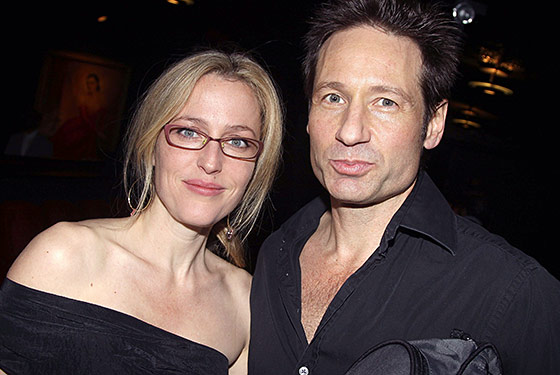

 Vous avez étudié la littérature dans de prestigieuses universités… Une incidence sur la façon dont vous incarnez Moody ?
Vous avez étudié la littérature dans de prestigieuses universités… Une incidence sur la façon dont vous incarnez Moody ? La Famille Jones, dont vous partagez l’affiche avec Demi Moore, sort cette semaine en France. C’est une satire sociale très américaine dans laquelle vous incarnez un père de famille encore une fois assez atypique…
La Famille Jones, dont vous partagez l’affiche avec Demi Moore, sort cette semaine en France. C’est une satire sociale très américaine dans laquelle vous incarnez un père de famille encore une fois assez atypique…